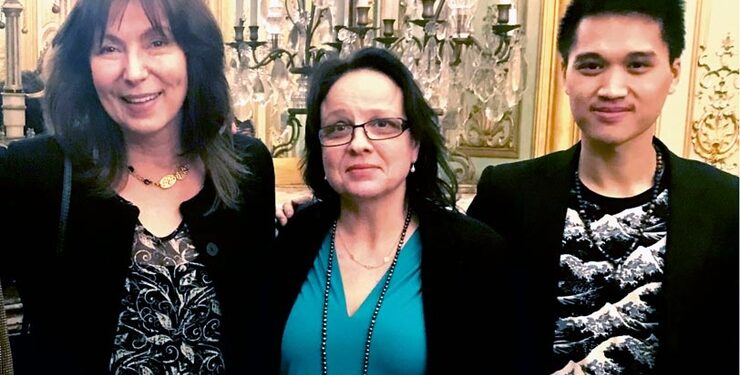[ad_1]
For the beginning of the varsity yr, we went to satisfy the crew from the Romanian Cultural Institute in Paris. We come again with them on their laborious work to advertise Romanian tradition and battle in opposition to clichés, regardless of this pandemic which has essentially disrupted their numerous actions. Stability sheet, tasks, prospects, you’ll know whereas studying the next.
Grégory Rateau: We wished to listen to from the Romanian Cultural Institute in Paris. How is your crew doing after this significantly troublesome interval for the cultural sector?
The crew of the Romanian Cultural Institute in Paris is doing nicely, and we’re fortunate that’s plain. We’ve got a brand new day by day, after all, for a few of us to telecommute. We should favor digital communication. Though digital was already built-in into our exercise as a complementary device, we had to make use of it as the primary situation for the implementation of our work, to proceed the Romanian programs or our numerous cultural occasions. To additionally see the brilliant facet of issues, we’re completely satisfied to have the ability to give free rein to our creativeness, reinvent our occasion communication, assume, rethink, compose and construct with new well being, social and financial information.
How did you adapt throughout this pandemic to increase your actions?
Being a cultural institute, our actions focus above all on face-to-face occasions, bringing in artists, painters and writers. Due to the pandemic, we needed to rework this behavior, to increase it on the web, by creating digital occasions.
We had been due to this fact capable of create these “collection” and new codecs, equivalent to “Bien Ensemble”, movies produced by artists, musicians or writers who associated within the type of interviews their methods of making and reacting to this very specific state of affairs. And this, immediately from us, by calling on an editor. In reality, we absolutely respect the really useful measures and social distancing, whereas persevering with to take care of our actions.
You’ve gotten prompt to varied personalities of the Franco-Romanian diaspora to rethink their confinement. What conclusions did you draw from this expertise lived “collectively”?
It was a particularly enriching expertise, as a result of these digital company had been from very broad horizons: journalists, writers, painters, musicians, poets, translators, and we wished to supply the general public a panoramic connection in these occasions of isolation.
In reality, the responses had been very informative and assorted, they gave the viewers a number of views. Nevertheless, we will draw the identical widespread thread: confinement and the pandemic generally, with the results we all know, represented a shock and an obligation to drastically restrict private and creative freedom. Then everybody reacted in their very own approach: there are those that took benefit of this obligatory relaxation time by attempting to watch the results, be taught classes, learn and examine and query themselves so as to to evolve; and there have been those that had been surprised by this era, shocked of their being, of their occupation, and who had been unable to create, to think about, to go additional.
On the one hand, for some, for whom their creative occupation was the primary supply of earnings, it was harder. Nevertheless, they talked about the assistance for intermittent leisure staff, and the useful measures taken by the French state. The white yr, which intermittents have claimed, has been applied. Alternatively, for many who have one other “supporting occupation” along with their creative exercise, issues have been comparatively simpler.
To conclude, we want to use the phrases of the playwright and author Alexandra Badea: “we should be taught sure classes from this ordeal, in any other case, all this era of loneliness, of generally struggling, of compelled isolation, can have been in useless.”
You your self have been immediately affected in your crew, with one individual testing optimistic for Covid-19. Are you able to inform us about it?
Certainly, we had been touched inside our crew; fortunately they weren’t critical types. This additional strengthened our sense of duty. It was an odd and unsure time, however we received previous it by remaining united with one another. And that is undoubtedly the important thing to this world enigma: solidarity and respect for others can save lives. That’s the reason we take sufficient measures to keep away from any hazard.
What are your plans for this fall?
We are going to proceed this large-scale program that began in Could and can finish in October, which we instructed you about above: “Good collectively. The creators of France throughout and after the coronavirus ”. To let you know extra exactly, these are interviews with 19 younger Romanian artists who work in France or translators from Romanian to French – a weekly assembly on our Fb and Instagram pages to see and hearken to them, get to know them. their hopes, their concepts for the long run but in addition to know how their technique of creation or interpretation works, of day by day creative work. We’ve got needed to cope with containment and post-containment, a interval that continues to be fairly murky.
Then, our first digital outing was with the exhibition “Face (s) of Europe” on the gates of the Tour Saint Jacques in Paris, a collective exhibition initiated by EUUNIC France, the place we’ll current images by Felicia Simion and her collection “Ethnographies”.
The Romanian Cultural Institute in Paris additionally hosts Romanian language programs for adults. Final March, within the midst of a pandemic, these programs had been held on-line. For the resumption of courses, in the beginning of the varsity yr, we’re sadly obliged to maintain this system on-line, given the evolution of the well being state of affairs in Paris.
Regardless of all the things, we are attempting to take small steps out of this dematerialization of our occasions, by providing actions for a small viewers, however which might be the event for bodily encounters with the artists. We are going to open the doorways of our gallery subsequent November for the exhibition “Vatra Luminoasă – the mannequin of backyard cities in Bucharest”, initiated by Jérémy Vercken de Vreuschmen, architect in Paris and great-grandson of Ion Hanciu, the architect who constructed the Vatra Luminoasă district within the mid-1930s in Bucharest. The exhibition, devoted to the French and worldwide public, will look at the district from three angles: historical past, structure and anthropology so as to present how this district, which is a part of the heritage, with exemplary structure, has gone by the completely different regimes and successive eras. It would additionally handle different fashions of European backyard cities, in addition to the query of heritage safety immediately.
Are you optimistic in regards to the “after”?
The optimist appears to be the one potential possibility so as to proceed anyway. What occurred this spring is quite a bit like Miyazaki's story … our Howl's Transferring Citadel (our world as we all know it) got here to an abrupt and unthinkable finish. Its restart, after the shock impact of this new actuality, was solely potential because of the existence of the wisp. Is that this the image of hope and of the way in which by which humanity has at all times discovered the energy to proceed, to reinvent and adapt. It is vitally possible.
There will definitely be an afterwards as a result of, fortuitously for us, all issues come to an finish, the great ones however particularly the unhealthy ones. There’ll due to this fact be an finish to this era of disaster, first an acute disaster and now sluggish, painful, with the financial penalties that everyone knows and from which the cultural sector isn’t spared. Greater than that, lets say, with out exaggerating, that the cultural sector has been essentially the most affected, and it’ll nonetheless be.
For the aftermath, which is able to observe with certainty in a while, hopes and needs to proceed and transfer ahead are there: alternatively, we have to be conscious that each one is not going to be as earlier than. There might be new methods of seeing occasions, of organizing them, of making an unprecedented relationship with the general public and even with ourselves, with new variables which, now, have turn into virtually sine qua non: distancing, the chance a return of the virus or the necessity to stay with it, the power to be succesful and agile throughout a paradigm shift, teleworking, the shift in the direction of extra digital, the necessity to discover new methods of expressing ourselves and to work.
Following the France-Romania season of the earlier yr, do you are feeling a palpable change in the way in which the French understand Romanians immediately?
The France-Romania 2019 Season produced an actual effervescence and an openness to new methods of creative expression, seen from either side. Partnerships with French cultural operators and establishments have confirmed their value and it’s now as much as us to proceed to construct our applications on this spirit.
Clearly, such a change in notion can’t be in-built a Season. However it’s apparent that its affect was vital. Romanian programs are far more in style. Younger individuals, magnetized by music, know Romania increasingly; the stay live performance that we organized with Cercle on the Embassy of Romania, the place the Romanian artist Lavatory carried out, was a convincing success: the massive viewers of youthful generations had by no means approached Romania intently, and it was for them a primary impulse to find the opposite actions of the Institute. As well as, individuals of Romanian origin, however who haven’t but had the chance to reconnect with their roots, come increasingly incessantly to us – they see the Institute as a super springboard, which we significantly honors.
The French, we’re positive, will see issues from different views; in any case, we’re engaged on it always. It’s to perpetuate this enthusiasm created by the Season that we manage occasions strengthening this cooperation, highlighting the numerous artists sharing between the 2 international locations. As well as, this yr we’re celebrating 140 years of diplomatic relations between Romania and France. That is why our mission is so vital to us: our ties are robust, and we should keep them in order that mentalities change in each international locations.
To conclude, we will say that it’s a pity that with this pandemic, we weren’t capable of absolutely exploit this openness given by the Season. However we aren’t shedding hope, quite the opposite! Whether or not it’s 140 years of diplomatic relations, or the upkeep of Timişoara as a metropolis of honor subsequent to Bucharest or for the Guide Truthful in Paris in 2021, Romanian tradition is and can proceed to be within the highlight – and it's as much as us to make it flourish for a very long time to return in France but in addition all over the place, overseas.
[ad_2]
Source link







